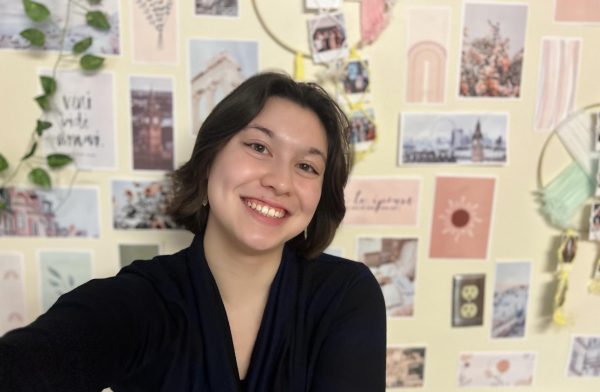On Tuesday, April 2 during Common Time, Visiting Assistant Professor of Classics Anastasia Pantazopoulou, who specializes in Athenian drama, presented a talk to Classics-interested students and professors entitled “The Female Experience of War: From Euripides’ ‘Trojan Women’ to Christine Evans’ ‘Trojan Barbie.;” This topic came from her current research project, which focuses on how the “stories of Euripides’ female characters” can be re-imagined and re-told through “the art of digital storytelling,” said Hazel Lillian Amland Grose Professor of Classics Chico Zimmerman, who introduced Pantazopoulou.
Pantazopoulou began by contextualizing the talk’s focus, stating that it was a “fairly recent project for [her]” that will “hopefully be part of a bigger project” in the future. She then went on to summarize the main piece of modern media that she uses as a foil against Euripides’ “Trojan Women.” As an adaptation of “Trojan Women,” Christine Evans’ “Trojan Barbie” tells the story of a female tourist in current-day Troy who is sent back in time to the fall of Troy during classical antiquity, tackling Euripides’ tragedy from a modern perspective. This allows both pieces to highlight that war “always has an enduring effect on women’s lives,” said Pantazopoulou, “often [leaving them] to pick up the pieces” in both the ancient and modern-day world.
Other current sources for Pantazopoulou’s research included the book “Iraqi Women: Untold Stories from 1948 to the Present” by Nadje Sadig Al-Ali and the film “Queens of Syria” by Yasmin Fedda. These works served as research regarding the lives of women during the war in Iraq and the lives of Syrian refugee women in Amman, Jordan within these respective “widespread climate[s] of fear,” said Pantazopoulou.
Following this overview, Pantazopoulou dove into the central notion of her presentation: that the enslavement, physical and sexual abuse and displacement experienced by women during war at different points in history greatly “impacts [their] sense of self.” She added that “their bodies [serve] as an extension of the battlefield,” meaning that “the Trojan women” exist in a state [JUMP]of limbo” due to the disruption that war brings.
The Trojan women are “passive receivers of the decisions that others make for them,” said Pantazopoulou, as they withstand suffering in forms ranging from physical and sexual violence to enslavement, displacement and entrapment. This “reality of enslavement and displacement…fills the hearts of the Trojan women with despair,” continued Pantazopoulou.
This despair and devastation may be grounded in womens’ roles within the “oikos,” the Greek word for “household,” during classical antiquity and as portrayed in drama from this time. When war forces women to leave their household, or entirely destroys it, a woman in these Athenian tragedies may “exist in a deconstructed world as a shadow of her former self,” said Pantazopoulou.
Throughout this talk, Pantazopoulou tied the experiences of the Trojan women, as expressed by Eurpides and Evans, to her other modern-day examples to demonstrate how “women exist…detached from any sense of their past identities” due to war. Though the circumstances that affect women have changed — for example, displacement due to the fall of Troy versus entrapment in one’s home due to the invasion of Iraq — these different contexts highlight the shared theme of a “sense of belonging, a sense of community” being “taken away” in that both groups of women were “still restrained” in their ability to determine their own actions “freely.”
To conclude, Pantazopoulou emphasized the importance of these female-centric stories, which are often ignored “in favor of their male counterparts,” as they foster a sense of solidarity by showing that “millions of others are suffering just like us,” hopefully encouraging the healing of women’s trauma due to the “sense of relief [experienced] when you share, when you cry with other people.” These stories also compel individuals “to reconsider the impact of war” in the modern world through classical examples.
Bee Candelaria ’24, a Classics student department advisor and major, stated that she “decided to go to the talk because I’m interested in the research of the classics professors, and I had not seen much of Anastasia’s work…My main takeaway was that I wanted to now watch ‘Queens of Syria; and look at how the movie was evoking classical references to Hecuba and other tragic women.”
Another one of the talk’s attendees, Hope Yu ’26, was personally “left thinking about what sort of research could be done with the potential for horizontal social mobilization, especially with regard to loss of class status, and community between the women after Troy’s fall as a way to provide a sense of agency and independence for these women’s narratives,” after the presentation.
“Professor Anastasia Pantazopoulou is currently my Latin professor and I also took a classics course with her last term! She carries a lot of passion for her work on Athenian dramas in the classical period and I always love to hear her discuss her thoughts, especially with regard to women’s lived experiences,” continued Yu. “This specific presentation was especially enthralling because I read a book in the summer by Natalie Haynes about this exact idea of elevating the voices of the women left after the Trojan war. Hearing that Professor Pantazopoulou was taking a more cross-temporal approach and incorporating similar modern sentiments of women’s experiences post-Iraq and Afghanistan wars especially piqued my interest.”
A variation of this talk was presented by Professor Anastasia Pantazopoulou this past weekend at a conference hosted by the Classical Association of the Middle West and South (CAMWS) in St. Louis, Missouri through Washington University–St. Louis.












